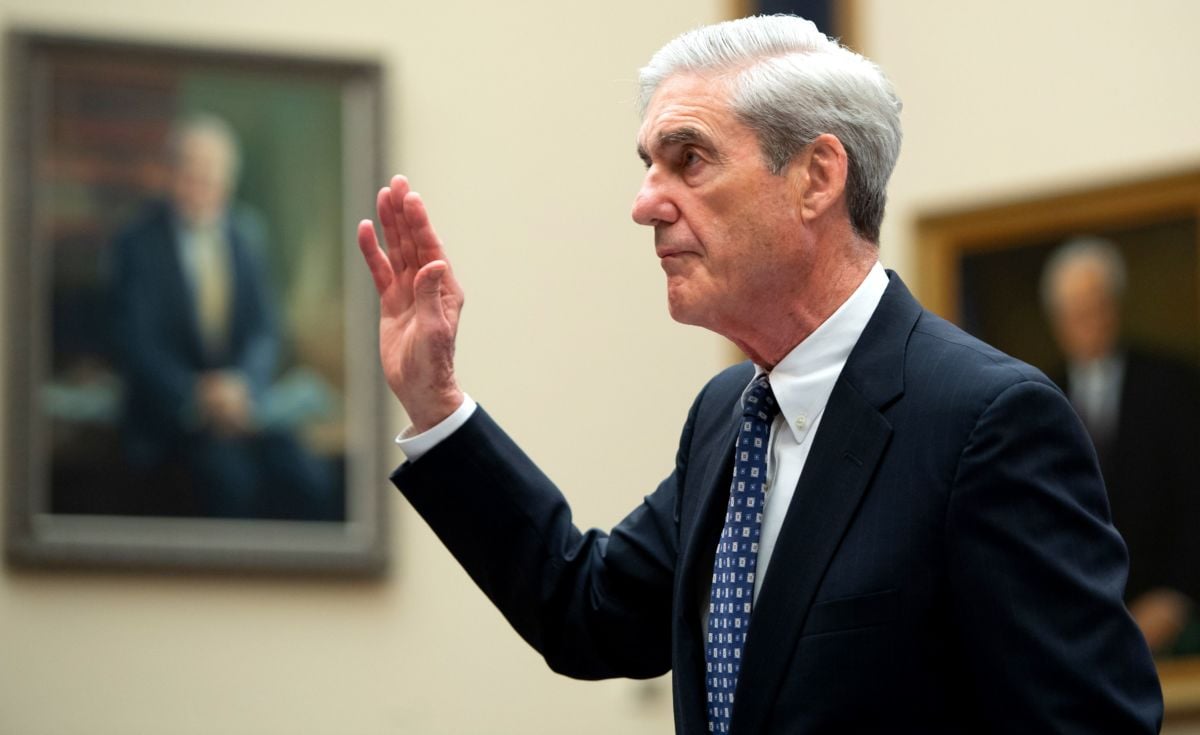Amid congressional testimony on Wednesday in which former special counsel Robert Mueller reiterated publicly that President Donald Trump “was not exculpated” of wrongdoing in his report, Democratic Congressman Ted Lieu of California also provided a succinct recap of why the only reason Mueller did not recommend charges against the president was because of an existing Office of Legal Counsel (OLC) memo stating that a sitting president could not be indicted.
“The reason, again, that you did not indict Donald Trump is because of OLC opinion stating that you cannot indict a sitting president. Correct?” Lieu asked.
And answered Mueller: “That is correct.”
Rep. Ted Lieu: ‘The reason, again, that you did not indict Donald Trump is because…you can not indict a sitting president, correct?’
Mueller: ‘That is correct.’ #MuellerHearing pic.twitter.com/uBv3jvQ9WH
— NowThis (@nowthisnews) July 24, 2019
Notably, after Lieu listed the “elements” of possible obstruction found in the report, Mueller said he wanted to be clear that just because those elements are listed does not mean that he would necessarily agree with Lieu’s effort to prove that Trump did obstruct justice.
Despite that — even as Vox’s Alex Ward warned it was not “exactly as big as you think it is” — the exchange was treated as significant by many watching the hearing. As the progressive advocacy group Public Interest tweeted:
.@RepTedLieu to recap:
-Trump ordered former WH counsel Don McGahn to fire you, then ordered him to cover it up
-Trump ordered Lewandowski to limit your investigation
Any reasonable person could conclude that the crime of obstruction of justice has been met. #MuellerHearings pic.twitter.com/KXNBmOkHte
— Public Citizen (@Public_Citizen) July 24, 2019
The exchange was characterized by some observers as “huge” and a “notable statement under oath” by Mueller:
Huge:@RepTedLieu explains 3 elements of obstruction of justice, Mueller confirms Trump met all 3. Then:@tedlieu: "The reason… you did not indict Donald Trump is because of OLC opinion stating that you cannot indict a sitting president, correct?"
Mueller: "That is correct." pic.twitter.com/aJ553CNfCg
— Rep. Don Beyer (@RepDonBeyer) July 24, 2019
Why does it matter? According to reporting by VICE News:
Mueller just told Lieu, for the first time, that government policy against indicting a sitting president was the key point that kept him from attempting to nail Trump for obstruction of justice.
An opinion by the DOJ Office of Legal Counsel argues that charging a sitting president would be unconstitutional — although plenty of lawyers, including former Clinton investigator Ken Starr, think that view wouldn’t survive a challenge in the Supreme Court.
Mueller is essentially confirming that he could say the president did not commit a crime but was blocked from saying the president did commit one, said Paul Rosenzweig, a former member of Starr’s team, who’s been watching the hearings closely.
“He viewed the OLC prohibition as a one-way ratchet,” Rosenzweig said. “He could exonerate, but he could not indict.”
Mueller may not have meant to go there today, but taken literally, he just pretty much stated that he would have indicted Trump if he’d been allowed to, Rosenzweig said.
While Mueller has stood by the mandate, he also stated during Wednesday’s hearing before the House Judiciary Committee that a president, while not able to be charged while in office, could be later indicted on obstruction of justice or other changes.
“Could you charge the president with a crime after he left office?” Rep. Ken Buck (R-Colo.) asked Mueller.
“Yes,” Mueller replied.
Join us in defending the truth before it’s too late
The future of independent journalism is uncertain, and the consequences of losing it are too grave to ignore. To ensure Truthout remains safe, strong, and free, we need to raise $43,000 in the next 6 days. Every dollar raised goes directly toward the costs of producing news you can trust.
Please give what you can — because by supporting us with a tax-deductible donation, you’re not just preserving a source of news, you’re helping to safeguard what’s left of our democracy.
